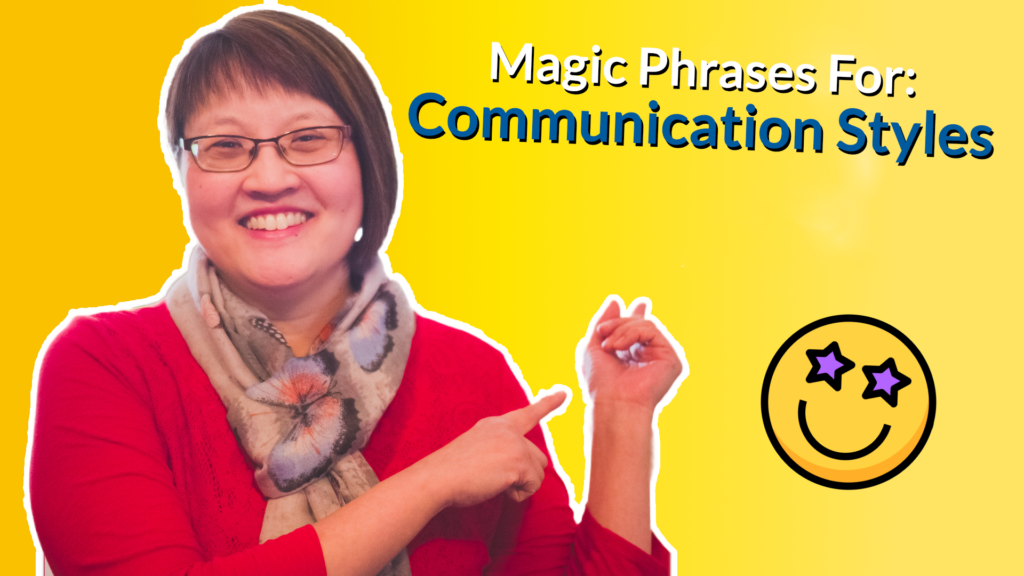Hi there, this is Grace, and welcome to Sensitive Communication Tips.
So I just want to do a quick review, because we’re already on the sixth part of COMMUNICATES. So, like I said, in the very beginning of the year that the word COMMUNICATES are broken into different parts.
So just a quick review. So the letter C and COMMUNICATES means Confidence, the O means Opinions, the M, the first M, is Messages or hidden Messages. The second M in COMMUNICATES is Monitor feelings, and then the U is Uncover misunderstandings, and then today for our topic, in COMMUNICATES it’s the N, which means Nurturing feelings. So, you might be asking,
Well, what is the difference between monitor feelings and nurturing feelings? Well, monitoring feelings is when you just realize that, hey, the conversation, there’s something kind of off or the mood had changed, or the feelings in the conversation might have changed. Nurturing feelings in communication, is making sure that you’re saying the kind words, that is, nurturing in a positive way as much as possible. Or if there is a disagreement, then the words that are spoken are in a constructive manner, so that we’re nurturing the conversation in a more positive, constructive way, rather than in a destructive way.
So for the tips that I like to use for nurturing feelings, to make sure that the feelings and the conver– in the conversation are being nurtured, is what I like to use the acronym GENTLE. So if you think about each of the words in GENTLE this might help you to be more constructive, not only to yourself, towards yourself, but towards others, when you’re nurturing conversations and nurturing the feelings in conversations.
So the first letter, the G, for GENTLE means Gracious. So being gracious, just simply means be kind. Use kind words, be kind to yourself and towards others, rather than in a critical or criticizing tone or words. So use kind words, and a constructive tone of voice, when need be, because sometimes not all situations, we can use an uplifting tone. However, we can still be gracious in a disagreement, if we use a constructive tone, direct, fair, but not overly aggressive. So the E, in the word, GENTLE means Expression. So what we mean by that is, even if you have a disagreement, or you felt you did something and you made a mistake, you can still use nice constructive words, to express yourself. And then the N in the word GENTLE means Nourish. Nourish your self, and with others, through use of good thoughts, good words, and nourish yourself so that you can reduce the stress. Because a lot of the times when we get aggressive, or we get sometimes into more of aggression, it’s because maybe perhaps we’re under stress. So we can nourish our mind and nourish our body that will help to reduce the stress, which will then nourish good feelings in a conversation. And then T, Timeout. Sometimes we just might need to just take a timeout, you know, step away from the situation from the conversation, or just take some nice deep breaths, collect our thoughts before continuing on. So that way we can stop ourselves, pause, rather than continue on and on with the argument. It should be if we have a disagreement. And then L means Look after yourself, and then Look after others. So it’s okay to you know, take care of yourself first before taking care of others. You know a lot of us tend to take care of others before taking care of ourselves. However, if you think of it this way, if you are not taken care of, then you won’t be able to take care of others. So it’s okay to take care of yourself first, through good self care, before taking care of others, weighing, you know, as much as you can, and then E for the word GENTLE means Empower. Empower yourself and others. So accept and acknowledge that there are going to be different viewpoints. And that that’s okay, and you can do so without the judgment of it being right or wrong. You know, you can just accept that and acknowledge another person’s point of view that might differ from yours. But you don’t necessarily have to put a judgement of it being right or wrong. And that will help to empower yourself, as well as others because you’re still standing your ground. But you’re also empowering others to say, you’re allowed to have your viewpoint. We might disagree, however, there’s no judgment of I being right or your being right, or I’m wrong, or you’re wrong. There’s none of that. It’s just we’re empowering each other, to allow each of us to speak our viewpoint.
So– So if you think of the word GENTLE, this will help you through the steps through the tips, nurturing your own feelings, and nurturing other people’s feelings that you’re speaking to end with during your conversation. And a lot of the times we’re also speaking to ourselves. And so again, remember gentle when speaking to yourself, especially when you make a mistake. It’s very– it’s very easy to be hypercritical of ourselves. But if we just remember to be gentle, that will also help to nurture the feelings when we speak to ourselves as well.
So I hope you found these tips to be helpful. If you would like to know more about how you can work with me to work with your communication, so that you can express your thoughts, feelings and desires without feeling overwhelmed, overshadowed or being overlooked. Then visit my website GraceSOULutions.com. That’s GRACESOULUTIONS.com to see how you can book a free communication breakthrough session with me. And I look forward to seeing you here again next time at Sensitive Communication Tips. Thank you for being here. Have a great day.
See you next time. Take care. Bye!




